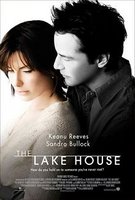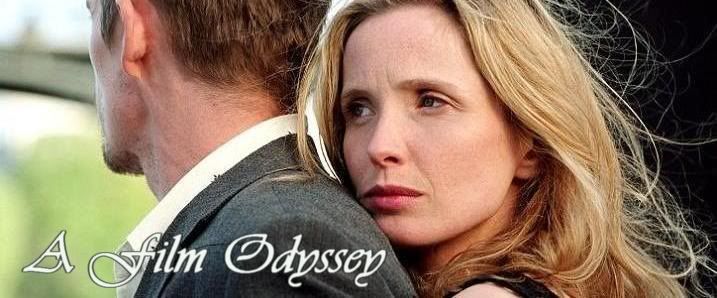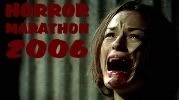 The Lake House
The Lake House employs a bourgeois narrative with a ripe sense of spirituality that borders on divine. For all its polished hoopla and handy-dandy supporting characters, thank director Alejandro Agresti for recognizing (and capitalizing on) the emotional power of a fine visual composition (not to mention his respect for his characters, who live and breath as part of the film rather than being whored out by the script). The titular architectural structure is a unique residence elevated above its shoreline domain on stilt-like appendages, build within and around its natural habitat (not unlike many Frank Lloyd Wright structures) rather than simply on top of it. It is here that Kate (Sandra Bullock) and Alex (Keanu Reeves) live, albeit two years apart, she in 2006 and he in 2004. When Kate moves out and leaves a note for the subsequent tenant in the mailbox, the two discover an inexplicable time portal, the post office’s property somehow existing outside of the timelines that otherwise guide their physical worlds. Subsequent letters sent back and forth through the newfound device instill an otherwise impossible relationship, compounded by the eventual realization of their own previous encounter(s). Certainly, the science fiction device makes little sense, but neither did it in
Back to the Future,
The Terminator or
12 Monkeys if you really think about it (at least when conforming to known physics), and for as easily as the premise could have slid into outright treacle, that alone makes
The Lake House its own little miracle (it is worth noting, however, that this is a remake of a
little known foreign film, as of now unseen by me). Aside from uncompounded character evocations, the most effective device here is the camera itself, constantly evoking a spiritual connection between the characters and their environments. Once established, the film takes full advantage of Alex and Kate’s time-defying intimacy, one magical sequence seeing them talking to each other on two separate park benches, passerby fading into and out of the composition, suggesting the intangibility of time, the fragility of prolonged existence and the wonder that any kind of love could ever arise out of such conditions.




 The Lake House employs a bourgeois narrative with a ripe sense of spirituality that borders on divine. For all its polished hoopla and handy-dandy supporting characters, thank director Alejandro Agresti for recognizing (and capitalizing on) the emotional power of a fine visual composition (not to mention his respect for his characters, who live and breath as part of the film rather than being whored out by the script). The titular architectural structure is a unique residence elevated above its shoreline domain on stilt-like appendages, build within and around its natural habitat (not unlike many Frank Lloyd Wright structures) rather than simply on top of it. It is here that Kate (Sandra Bullock) and Alex (Keanu Reeves) live, albeit two years apart, she in 2006 and he in 2004. When Kate moves out and leaves a note for the subsequent tenant in the mailbox, the two discover an inexplicable time portal, the post office’s property somehow existing outside of the timelines that otherwise guide their physical worlds. Subsequent letters sent back and forth through the newfound device instill an otherwise impossible relationship, compounded by the eventual realization of their own previous encounter(s). Certainly, the science fiction device makes little sense, but neither did it in Back to the Future, The Terminator or 12 Monkeys if you really think about it (at least when conforming to known physics), and for as easily as the premise could have slid into outright treacle, that alone makes The Lake House its own little miracle (it is worth noting, however, that this is a remake of a little known foreign film, as of now unseen by me). Aside from uncompounded character evocations, the most effective device here is the camera itself, constantly evoking a spiritual connection between the characters and their environments. Once established, the film takes full advantage of Alex and Kate’s time-defying intimacy, one magical sequence seeing them talking to each other on two separate park benches, passerby fading into and out of the composition, suggesting the intangibility of time, the fragility of prolonged existence and the wonder that any kind of love could ever arise out of such conditions.
The Lake House employs a bourgeois narrative with a ripe sense of spirituality that borders on divine. For all its polished hoopla and handy-dandy supporting characters, thank director Alejandro Agresti for recognizing (and capitalizing on) the emotional power of a fine visual composition (not to mention his respect for his characters, who live and breath as part of the film rather than being whored out by the script). The titular architectural structure is a unique residence elevated above its shoreline domain on stilt-like appendages, build within and around its natural habitat (not unlike many Frank Lloyd Wright structures) rather than simply on top of it. It is here that Kate (Sandra Bullock) and Alex (Keanu Reeves) live, albeit two years apart, she in 2006 and he in 2004. When Kate moves out and leaves a note for the subsequent tenant in the mailbox, the two discover an inexplicable time portal, the post office’s property somehow existing outside of the timelines that otherwise guide their physical worlds. Subsequent letters sent back and forth through the newfound device instill an otherwise impossible relationship, compounded by the eventual realization of their own previous encounter(s). Certainly, the science fiction device makes little sense, but neither did it in Back to the Future, The Terminator or 12 Monkeys if you really think about it (at least when conforming to known physics), and for as easily as the premise could have slid into outright treacle, that alone makes The Lake House its own little miracle (it is worth noting, however, that this is a remake of a little known foreign film, as of now unseen by me). Aside from uncompounded character evocations, the most effective device here is the camera itself, constantly evoking a spiritual connection between the characters and their environments. Once established, the film takes full advantage of Alex and Kate’s time-defying intimacy, one magical sequence seeing them talking to each other on two separate park benches, passerby fading into and out of the composition, suggesting the intangibility of time, the fragility of prolonged existence and the wonder that any kind of love could ever arise out of such conditions.





Uh....buddy
http://www.imdb.com/title/tt0282599/
That's the link to the original film, I don't know what the hell you posted. =/
Posted by Anonymous |
11:07 AM
Anonymous |
11:07 AM